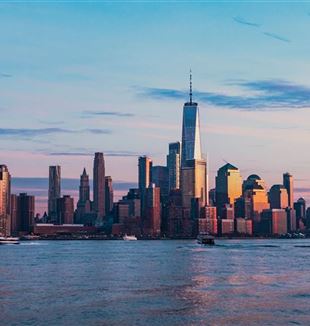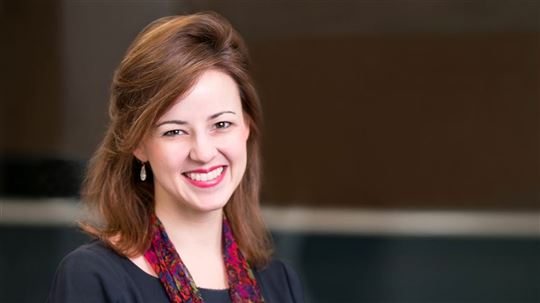
Anne Snyder: "We are in a big delivery room"
She is editor-in-chief of the cultural magazine "Comment" and a keen observer of American society. From her "refuge" in Maryland she says: "Nothing had prepared us for this earthquake of uncertainty. Now we accept the call to change.""These days we are not in our home in Washington, but in the country, in Maryland, where there is more space. Some of my husband’s relatives (David Brooks, columnist for the New York Times), and other people who would have nowhere else to stay, have come to quarantine with us. There are seven of us in total. I work and take care of the house and keep work going for the next issue of Comment." Her name is Anne Snyder, and for some months now she has been editor-in-chief of the important cultural magazine related to Cardo, a Christian inspired think tank based in Canada. In the past, she has written for The Atlantic Monthly, The Washington Post, National Journal, City Journal and other national newspapers. She has recently published The Fabric of Character: A Wise Giver's Guide to Supporting Social and Moral Renewal. She was one of the speakers at the 2019 New York Encounter and this year she returned as a friend. We caught up with her in her "refuge" in Maryland to ask her what she is learning about herself and about America during this pandemic.
How are you living these strange days?
Those who know me well say that I am a person who does not like change. And maybe, in a way, that is true. And yet, part of me is always looking for adventure. And I see these two aspects of my personality come into play both in my new role as "Maria von Trapp" and as editor of a cultural magazine. The point is that all of us, depending on our personal history, have experienced fear, fatigue, suffering, but it seems that nothing has prepared us to live this earthquake of uncertainty that has struck the world.
What makes you struggle the most?
It is one thing to steer the ship when you know the direction you are heading. It is relatively easy. It is another thing to do it when you do not know where the rough waters are taking you. I am thinking mostly about working for the magazine, where I try to give direction to a community of intellectuals.
What has this crisis brought out in the people around you?
I see that those who are more courageous, or have a more pronounced spiritual freedom, tend to be more honest about their inner frailties. And this is regardless of whether they are believers or not. At a time like this, then, all the comfortable answers about God and about what the world should be are put to the test. Do we really believe in Providence? We know it exists, but the way it decided to act remains a mystery. I perceive that all of this uncertainty is making us more humble.
What judgment have you made about the situation we are living, from the point of view of society...
At the moment, like many, I have the perception that we are going through a historical moment comparable to the Great Depression, after 1929, or comparable to the Second World War. We are at a turning point. I do not have the gift of prophecy and I could be wrong. Maybe we can get back to normal, as it was before the pandemic. But I do not think so. I cannot foresee the nature of this change, but it will be radical. We will see the death of certain aspects of our manner of living together. But the metaphor that I would use to describe what we are living is positive, and it is that of childbirth.
In what sense?
I do not say this lightly, without feeling a deep pain for all those who are dying. But I think opportunities are opening up. We are still at the beginning of the process, but we are already seeing positive signs.
What are they?
I happen to hear people, who in the past would never have done this, wondering about the meaning of life, how we should treat each other, what the nature of common good is. What is justice? New questions will also arise for us too: what is a community, now that we cannot be together physically? And what was it when we could get together? And what was that anxiety that characterized life in our cities? In a way, the pandemic has accelerated reflections that were already in the air in some way throughout the world. This dynamic bodes well for me.
What is the value of posing these new questions?
If we understand that the world is going to change, we need to recognize everyone's responsibility in this process. If the world will be re-designed, how will it be re-designed? It is an invitation to me and to everyone who wants to play a role in this change. And everyone will participate in this process by contributing their talents, but also their weaknesses and wounds. Their gifts. And the question is: how can we give all this back humbly so that it will be useful to achieve a more just society? I perceive this circumstance as an appeal, a call to be part of the team of this great delivery room.
In this regard, what point should we work on?
In the United States, we see that people are suffering what is happening in different ways. We see those who are dying, and those who are not. Those who are more vulnerable, and those who have a back-up plan.
What have you already seen change around you?
I do not know. Maybe it is still too early to really understand it. But I realize that I am learning what it is like to live, truly, in a community for an extended and indefinite time. With people who are not blood relatives, but who, because of the circumstances, have become a family for a while. How to live together? At first, I was overwhelmed by the increased "emotional bandwidth." But I now see that it has been precious to come together, even within each of our vulnerabilities. The gift of encountering weaknesses. In America, we are not accustomed like you, in Italy, to follow a certain ritual throughout the day, where you have lunch with the same people every day and spend an hour or two talking. It is a discovery. And then: Zoom. I tend to be suspicious of technology, but I have to admit that it is really useful. Theoretically, we know that a long-distance meeting does not have the same dynamic and intensity as a face-to-face dialogue. However, we are realizing that, despite everything, something happens. And it is useful. I am curious to see how it will end: who knows, maybe we will become a more disciplined and wise society, in which technology can help create and promote healthy relationships, contrary to what it has tended to do so far. Then there is a slogan, which I have always considered a cliché, and which perhaps could now take on real meaning, particularly due to the risk of collapse of the world economy: Think global, act local.
Why?
I think that today we really have the opportunity to take root in a place, as rarely happens in America. Having connections with the world, but returning to live in a village dimension. I am thinking about professional mothers who, particularly if they have young children, are struggling much more than their husbands at the moment. The value of the neighborhood could help in this regard, forming an extended family.
Is there any "small ideology" from which you have freed yourself in recent days?
Maybe it is still too early to see it, it is as though I am still in “crisis mode” and I cannot look at what is happening to me with detachment. But six or seven years ago, I lived a moment in which many things suddenly changed: family, vocational certainty, geographical situation... Everything turned upside down in a short time. This, in itself, did not prepare me for what we are experiencing now. However, I then reached a breaking point that allowed me to acquire a higher level of awareness. This situation is very different from what it was then, but I now know that it is a dynamic that can be repeated on a different plane. You can hit bottom and come out of it, not with an answer, but with a light, considering that there is a different context in which to regard the things that happen in your life.
Julián Carrón says that only a presence conquers fear, like that of a mother for a child.
If I had not had to deal with a human presence, the fear, the whirling abyss in my mind and heart, would be even more palpable. A kind of fear of the unknown. I remember that a few weeks ago, just before the lockdown, when the severity of the pandemic was already clear and I realized that we were not prepared, I felt a great weight. My magazine is called Comment and its subtitle is Public theology for the Common Good. At that moment, I asked myself: if this crisis completely changes the way our society will function, what will the common good be? What will it be in the face of all these deaths? I felt rebellion within me. It was as if, deep inside me, I wanted to move forward as if nothing was happening. Then a few days later, I was in the car alone, I felt the need to ask for the strength to face this situation, to ask to be guided to redirect my gaze and to be docile towards the pain that the situation aroused in me. I did not know if I was equipped to do that. And the question remained: if you are not a frontline doctor saving lives, but your job is to run a newspaper, at a time like this, what do the ideas rooted in the God of love and hope have to say to you? I am sorry for being so vague, but perhaps it is because of the moment of great uncertainty that we are living.
And yet you said earlier that you were positive about the future...
To describe this period, I am reminded of a series of works by the Japanese contemporary artist Makoto Fujimura, made by re-composing shards of vases, which belonged to his ancestors, with gold. We see that the ancient vase is full of "scars", but those wounds make it more precious and more beautiful. Perhaps in the future we will perceive ourselves as one of those vases.#Coronavirus